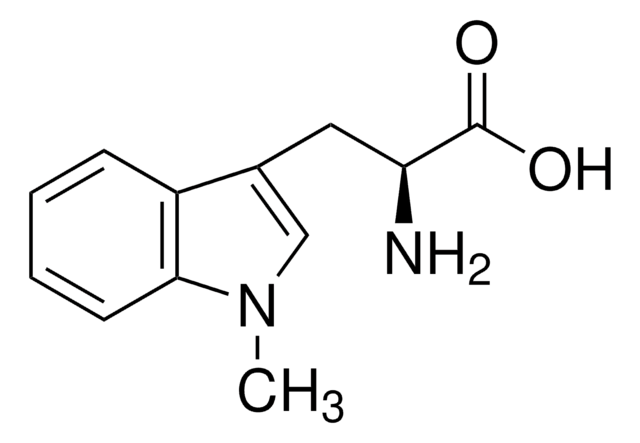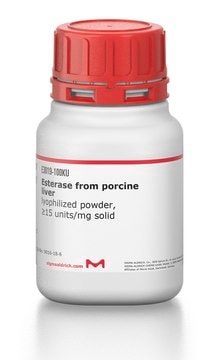M8377
α-Methyl-DL-tryptophan
≥98% (TLC), suitable for cell culture
Synonym(s):
α-methyl-tryptophan
About This Item
Recommended Products
product name
α-Methyl-DL-tryptophan, crystalline
Assay
≥98% (TLC)
Quality Level
form
crystalline
technique(s)
tissue culture: suitable
color
light yellow
storage temp.
2-8°C
SMILES string
CC(N)(Cc1c[nH]c2ccccc12)C(O)=O
InChI
1S/C12H14N2O2/c1-12(13,11(15)16)6-8-7-14-10-5-3-2-4-9(8)10/h2-5,7,14H,6,13H2,1H3,(H,15,16)
InChI key
ZTTWHZHBPDYSQB-UHFFFAOYSA-N
Application
- Nanoengineered sonosensitive platelets for synergistically augmented sonodynamic tumor therapy by glutamine deprivation and cascading thrombosis.: This study explores the use of a-Methyl-DL-tryptophan in enhancing sonodynamic tumor therapy through the deprivation of glutamine and inducing thrombosis, offering a new approach to cancer treatment (Zhou et al., 2023).
- Transporter targeted gatifloxacin prodrugs: synthesis, permeability, and topical ocular delivery.: This article describes the application of a-Methyl-DL-tryptophan in developing transporter-targeted prodrugs, enhancing drug delivery systems, particularly in ocular treatments (Vooturi et al., 2012).
- SLC6A14 (ATB0,+) protein, a highly concentrative and broad specific amino acid transporter, is a novel and effective drug target for treatment of estrogen receptor-positive breast cancer.: The study investigates the role of a-Methyl-DL-tryptophan in targeting SLC6A14 for treating estrogen receptor-positive breast cancer, highlighting its potential as a therapeutic agent (Karunakaran et al., 2011).
Biochem/physiol Actions
Storage Class Code
11 - Combustible Solids
WGK
WGK 3
Flash Point(F)
Not applicable
Flash Point(C)
Not applicable
Personal Protective Equipment
Certificates of Analysis (COA)
Search for Certificates of Analysis (COA) by entering the products Lot/Batch Number. Lot and Batch Numbers can be found on a product’s label following the words ‘Lot’ or ‘Batch’.
Already Own This Product?
Find documentation for the products that you have recently purchased in the Document Library.
Customers Also Viewed
Our team of scientists has experience in all areas of research including Life Science, Material Science, Chemical Synthesis, Chromatography, Analytical and many others.
Contact Technical Service






